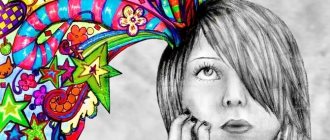Illusion is the human perception of an object or phenomenon in a distorted way. The concept of illusion comes from the Latin illudere - to deceive. In other words, the main causes of illusion are the consequences of deceptions of perception. In order to reveal these deceptions, to change obviously erroneous actions from them, today psychologists are studying and revealing the causes of illusion. It is also a popular and interesting topic for the average person, it is akin to playing with our senses. The most well-known, easily observed visual illusions occur due to the peculiarities of the eye structure, overestimation of size, incorrect perception of movement, and contrast.
Definition
The practical study of the phenomenon of “illusion” began with experiments in 1899, when test subjects were asked to estimate the weight of buckets equally filled with sand when they were lifted blindly. At the same time, the experimenter said that each subsequent bucket was filled with a large amount of sand. Participants in the experiment confirmed that lifting the load became more difficult.
A representative of the Würzburg school of psychologists, R. Müller, was the founder of this kind of experiments and, on their basis, suggested that weight distortion occurs under the influence of attitudes formed by the brain of the person being tested.
Psychologists of the Gestalt school, studying anomalous phenomena in nature (mirages, light refraction), proposed to consider their perception by people as an illusion.
The psychological concept of “illusion” implies the study of a person’s state in which he has an abnormal, deformed perception of the world around him.
Distortion of reality occurs in a person when his senses inadequately perceive objects and relationships with other people. Illusions can arise due to a person’s faith (in God, fate, destiny).
Liberation from illusions in psychology is finding the causes of their occurrence, an attempt to eliminate incorrect perceptions during psychological sessions or practical measurements.
What is an illusion?
A similar phenomenon can be created by a skilled magician or mother nature herself, but it happens that a person deceives himself. An illusion is when a real object or phenomenon is perceived in a distorted form and is understood ambiguously. It is believed that illusion is a companion to any mental illness, but this is not entirely true; a healthy person is also capable of experiencing illusion. How can you see an illusion?
- Due to optical illusion.
- Being in a state that is unusual for a person (drug intoxication, pathology or emotional state).
In everyday terms, illusion refers to hopes and dreams. The unreal world that illusion creates is a world of self-deception, and serves as a means that makes life easier for a person or is even a flight of his imagination. Human consciousness always strives to protect itself from shocks and strive for illusion, encourages dreams of a miracle, creates images of a “beautiful life” or ideal people.
Kinds
Illusions in psychology are various manifestations of transferred sensations that affect human organs and his psyche. They come in several types.
Illusions of healthy people
Illusions can occur in absolutely healthy people and are divided into the following types:
Physical. Types of physical illusions are determined by optical distortions of reality perceived by a person when contemplating objects.
For example:
- a straight stick immersed in a container of water will appear refracted and shortened;
- the disk of the Moon at sunrise and at zenith has a different diameter;
- a brightly illuminated object “stands before the eyes” for several seconds, although in reality the gaze has moved to another place;
- a rainbow after rain is tangible and material, although it consists of tiny water drops;
- when looking at distant mountains in clear weather with low air humidity, they seem much closer to the real distance.
- Cognitive.
Cognitive illusions are formed on the basis of assumptions about the environment that affect visual sensations, and they can be:
- distorting when the perception of the geometric dimensions of objects or their location changes;
- ambiguous (Rubin vase, Necker cube);
- paradoxically distorted;
- fictional.
- Physiological.
Physiological illusions are temporary and arise in a person under the influence of strong emotions, high tension, and chronic fatigue.
For example:
- distortion of the perception of time against the background of monotonous work;
- irritation from the process of normal communication with people after insults or great negative impact;
- “falling out of reality”, “withdrawing into oneself” while focusing on the problem being solved.
- Affective.
Affective illusions arise in healthy people under the influence of previously experienced emotions and stressful situations.
For example:
- expecting troubles when traveling in the dark in unlit courtyards, entrances, and passages;
- fear of animal attacks in an unfamiliar forest or wasteland;
- fear of drowning when swimming in the sea;
- perception of non-existent sounds.
Pathological illusions
Illusions in psychology are, among other things, phenomena related to a person’s psychological state and his health. A sick person replaces reality with fiction. Illusions are divided into the following types:
- Verbal. Verbal illusions are associated with distorted perception of speech.
For example:
- messages on the radio, the speech of the announcer from the television receiver are perceived as a direct appeal to the patient;
- threats, insults or swearing are not perceived by the person as relating to him;
- a calm dialogue is perceived as an immediate threat.
- Organic. Organic illusions are associated with a distorted perception by the senses of the location of objects around, their size, shape, and color.
- Awareness. Illusions of awareness are formed in a sick person under the influence of the feeling that someone is constantly nearby. If left untreated, this type of disorder can develop into delusions or persistent hallucinations.
- Perceptions. Under the influence of a false perception of the surrounding reality, a sick person forms incorrect sensory impressions, which for him develop into false opinions or judgments.
- Paraidological. Illusions of a paraidological nature are associated with a sick person’s visual perception of the patterns in question, which are formed in the brain into unreal, fantastic images and pictures.
What types of illusions are there?
For every sense organ there is at least one illusion, there are a lot of them. The types of illusions that a person can experience have their own division:
- optical – this is an erroneous visual perception;
- sound – hearing loss;
- physiological - peripheral or central parts of the sense organs did not work correctly;
- awareness - a feeling of presence, also classified as a form of hallucination;
- physical – associated with natural phenomena;
- affective - can appear with a sharp change in mood;
- organic – erroneous perception of colors, sizes and shapes;
- pareidological - creating pictures using thoughts.
Pareidolic illusions
Illusory perceptions of real objects are called pareidological illusions. Such illusions can arise when a person examines a pattern of wallpaper, fabric, stains or cracks, or clouds. You can see not only faces or objects, but also fantastic images. This happens as a result of the effect of a dual image, when the illusion of depth or recognition images is created specifically for provocation. This appearance can be observed in several people at once when examining some well-known object, for example, a cultural property.
Affective illusions
Being in a certain emotional state of mind, and at the same time, finding himself in an unfamiliar place, a person is able to see almost incredible things. A striking example is a night visit to a cemetery. Being under the influence of fear and expecting something bad, any person is able to see an affective illusion. Or if there is a fear of spiders, and there is a new, unfamiliar place, a person will be afraid of their appearance from everywhere. Many people are able to see different types of illusions. Affective illusion can appear even in a healthy person.
Physical illusions
Some pilots in their stories emphasize that if you fly over the sea when the stars are reflected in it, you get the feeling of an inverted flight. The main feature of physical illusions is their dependence on the mental state. Physiological or physical illusions are short-term phenomena, they are episodic. If a person is able to critically assess the situation and understand that it is an illusion, then this indicates his psychological health.
How are physiological illusions created? A striking example is a violation of the eye, when “by eye” it is very difficult to determine the distance from a person to an object. Real indicators and a false perception of distance give rise to this type of illusion. Almost all people encounter this type of illusion and, knowing that it is an illusion, easily correct it. This type of illusion is a feature of the structure of the eye and lighting effects.
Nature of occurrence
Illusions in psychology are phenomena of the human psyche caused by a number of natural causes.
Such reasons include:
- natural physical phenomena of a natural nature (optical distortions of reality);
- suggestion of surrounding people, forming a distorted perception of objects or phenomena;
- exposure to medications, drugs, strong alcohol;
- exposure to physical pathologies (high temperature, hypothermia);
- nervous breakdowns, strong feelings, stressful situations;
- mental disorders or diseases;
- synesthesia (mixing of sensory sensations during the creative process: the perception of a non-existent color when composing or listening to a melody, the formation of sounds while writing works while contemplating images or landscapes).
Functions and role
Illusions, like stereotypes, are formed in the human mind from early childhood. External influence (parents, peers, educational institutions) is superimposed on the desire to exist in a comfortable, consistent, understandable world. Each person builds his own corner in life, which can differ significantly in perception (illusoryness) from the surrounding reality.
Illusions, in their essence, are a protective measure of the consciousness of a person trying to combine the real difficulties of existence and the embodiment of aspirations to achieve the intended goals. Formed illusions rooted in the consciousness, like a stone around the neck, do not allow a person to “surface” to the surface of life, pulling him into the abyss of an invented, cozy pool in which everything is clear and comfortable.
The process of breaking down the illusory constructions of a particular person is always painful and nervous. Faced with harsh reality, a person is forced to reconsider his stereotypes and formed illusions. At the same time, new mental constructs are formed in the brain, which require confirmation with examples.
Breaking stereotypes and illusions (frustration) is accompanied by stress, nervous disorders, and the formation of phobias and misconceptions. At this stage, you need to analyze incorrect premises and determine new guidelines for yourself in life.
The meaning of the word "illusion"
Illusion
Illusion
♦Illusion
Not the same as an error. Illusion is a representation that is captured by its own point of view. Even the awareness of its falsity cannot shake the illusion: I know perfectly well that the Earth revolves around the Sun, but this does not in the least prevent me from seeing how the Sun moves across the sky from east to west. “An illusion,” writes Kant, “is a delusion that remains even when they know that the imaginary object actually does not exist” or is different (“Anthropology...”, § 13). Thus there is a positivity of illusion. If error is only a lack of knowledge (due to which it is nothing and is destroyed by truth), then illusion is characterized rather by an excess of faith, imagination or subjectivity: it is a thought that explains itself not to the reality known to me, but to the reality that I myself am.
This subjectivism can be purely sensory (illusions of the senses) or transcendental (if, following Kant, we accept the existence of illusions of reason). However, most often it appears in the form of desirable subjectivism: to build illusions means wishful thinking. It is in this sense that Freud interprets the term: “The characteristic feature of illusion,” he writes, “is that it arises from human desires” (“The Future of Illusion,” VI). Thus, not every error is an illusion, just as not every illusion is an error. I can make mistakes not at all because I want it (and this will be precisely a mistake, not an illusion); and I may not be mistaken, although my thought is based not on knowledge, but on desire (and this will be an illusion, not a mistake. For example, a poor girl believes that a handsome prince will marry her. Several cases of this kind, as Freud notes, actually took place). Therefore, an illusion, although it can be false (and even more often than not, is false), cannot be considered a special type of error. This is not a type of error, but a type of belief: “We call such a belief an illusion,” Freud continues, “in the motives of which the fulfillment of desire prevails,” regardless of its relationship to reality. This is a belief in the feasibility of a desire, or a trusting desire.
If, following Spinoza, we assume that every judgment about values presupposes desire and is reduced to it (Ethics, Part III, Theorem 9, Scholium), then it follows that all our values are illusions. This does not mean that they should be abandoned. On the contrary, we cannot do without them (since we are creatures of desire) and should not do without them (otherwise humanity simply will not survive). Illusions are necessary, and we are able to get rid of some of them only to immediately fall into others. “Only an ideological concept of society can imagine societies without ideologies,” writes Althusser. Only by following the illusory concept of humanity can one imagine a humanity devoid of illusions.
Forms of manifestations and physiology
Illusions can manifest themselves in various forms and take the form of delusions.
The forms of illusory manifestations can be:
| Sign of manifestation | How does it manifest itself? | Consequences |
| Sincerity of illusory constructions. | A person believes in his illusions, considers them correct, and is conservative in his views. | Avoiding reality, solving emerging problems and difficulties. |
| Illusions become part of the game (invented role). | A person plays a certain role in society, team, family. | Advancement in politics, at work, securing status, gaining followers, exalting one’s personality, deceiving people. |
| Illusions develop into delusions that are beneficial for mental comfort. | A person follows not the “voice of reason”, but his own illusions, and is ready to “turn a blind eye” to obvious things and actions of other people. | Inevitable disappointment, breakdown of life structures, stress, negative consequences. |
| Fanaticism | Illusory constructions and external influences replace the analysis of reality. | Fanatical pursuit of a false goal, destruction of personality, submission to an idea. |
| Revision of illusions under the influence of the external world. | Gradual revision of principles, stereotypes, illusions and misconceptions under the influence of incoming information and surrounding people. | Formation of a new approach to life problems, adjustment of relationships with people and society. |
The physiology of creating illusions is a process of thinking under the influence of many factors, as a result of which any person forms an internal picture of the perception of the world around him, tries to determine and consolidate his place in it. The imaginary universe of the individual is integrated into the real world, helping the person to feel part of it, adapt and adjust to its manifestations.
Examples
A person creates many illusions in life.
The following illusions can be considered examples of such constructions:
- all people are kind, cats are affectionate, and dogs are evil;
- all parents love their children;
- homemade food is the healthiest and most delicious;
- it is impossible to drown in the sea because the water is salty and keeps the body on the surface;
- every person is born for great things;
- Every citizen can become a successful politician;
- the state takes care of all its citizens;
- Only in an educational institution can one obtain the knowledge and necessary skills.
Diagnostics
The process of diagnosing an illusory state can be divided into several types.
The most common of them are:
- Illusions about one's personality. Determination of attitude towards oneself (negative or positive). Finding the origins of the formation of initial illusions. Determining methods for changing a sign or forming a new “starting point” for one’s own improvement.
- Illusions about surrounding people. Replacing real relationships that can be analyzed with fictitious ones that are far from the present, leading to conflict or a false interpretation of situations.
- Socially formed illusions. Stereotypes of behavior and relationships that have developed in society, which are projected onto people and form illusions in them. Such constructions include the following:
- a single person with a child cannot build their own happiness;
- a woman must meet beauty standards;
- you need to search for your “half” ad infinitum;
- a man must be strong and courageous.
- Mixed illusions. A combination of several types of illusions (about oneself, another person, family, self-affirmation in life), the embodiment of which leads to discomfort and many difficulties. As a rule, the efforts of one person do not coincide with the desires of another.
- Illusions about one's own future. The process of achieving goals in one’s illusory universe may conflict with the real state of affairs, abilities, capabilities and the availability of the necessary means. Illusions can turn into a “distant star”, causing a person to become apathetic, indifferent, and unwilling to fight for a dream.
Professional psychoanalysts can help people who contact them if the very purpose of the appeal is clearly defined. The patient must formulate for himself and the psychologist what result he would like to receive as a result of the sessions.
How to stop living in a fictional world?
Illusions, considered in psychology, are the mental state of a person living in his own fictional world, which differs from reality.
People, at the same time, may not be aware of the discrepancy between reality and fiction, and use the created illusion as a shield from the problems and experiences of the real world. This attitude contributes to the development of mental disorders and leads to disorders and diseases.
Practical ways to avoid illusions are as follows:
- you need to accustom yourself to life according to a plan (schedule), find time for work, rest, communication, hobbies;
- try to streamline your life, put things in order, in the workplace, at home, in the country;
- end each day with an analysis of the time lived, the situations experienced, and model ways to overcome the difficulties that arise;
- change your attitude towards work and communication with family, friends, colleagues;
- look for ways to relax under high tension, stress, chronic fatigue;
- use the help of a psychologist to overcome your own fears, existing prejudices, and psychological barriers.
Illusion, as a human condition, in psychology is the pressure on him of external factors that distort the perception of reality. It depends on the individual himself whether he will go into the illusory world of fantasy or try to obtain the necessary knowledge to comprehend the surrounding reality.
Author: KVM_1961
Illusions - psychology
All people are prone to worry, make difficult decisions, and seek answers to questions. People have illusions in order to remove uncertainty in certain matters. What is illusion in psychology? This is the formation of one’s own image of vision and replacing it with the real and real. Illusions can help a person relieve anxiety and tension. Even if in illusions the image is negatively colored, the person will be warned what he should be wary of.
Such thinking is initially erroneous and may have nothing to do with reality. Psychologists do not classify such illusions as human diseases, but recommend stopping living in an illusory world. Living in illusions all the time is, to say the least, stupid. If a person lives and constantly harbors illusions about other people, then he needs to see a psychologist.
Causes of illusions
When a person observes how a spoon bends when immersed in a glass of water, this is not a mental disorder. This is an illusion that can occur in any healthy person. Illusions more often arise in a person with a wild imagination and visit creative people. People may see or hear things incorrectly due to stress or fatigue. But if the illusion is already a faithful friend and visits with enviable frequency, then this is most likely a mental illness.
It also matters what specific illusion comes to a person. The sound of dripping water from a closed tap is not a reason to run to the doctor; it is much more serious if voices are heard from time to time. The reasons for many illusions are unknown to this day; they have no scientific explanation. Living in a world of illusions means constructing your life as if human existence were taking place in another world. It doesn’t matter whether the illusory world is better or worse, the main thing is that it is different.
How to stop living in illusions?
A person’s behavior in certain situations and his decisions always lead to certain consequences. A person who has chosen the path of living in illusions begins to use the rules of the fictional world in the real one. He chooses for himself that model of behavior that could be effective in his illusory world, but not in reality. Having illusions in a mild form is sometimes even useful, but living in them is dangerous, so you need to know how to get rid of illusions.
- It is worth making an attempt to bend the world of illusion to suit yourself. You need to start a war with him in your subconscious and burn out all those ideas that are far from reality. People who continue to live in an imaginary world are future demonstrators. They are ready to vent their anger on anyone at hand. They complain about life to random people, fellow travelers, on social networks.
- A person should understand that reality is what it is, it will not be different. All failures are caused not by the fact that a person is bad, but by the fact that he acts incorrectly, looking back at his illusions. A person needs to grow up. Becoming an adult does not mean giving up your goals and stopping wanting to see your life better, it means accepting the truth, getting to know the world, learning to understand it correctly.










